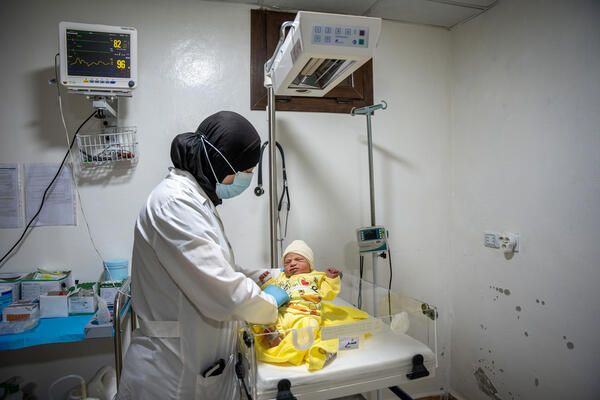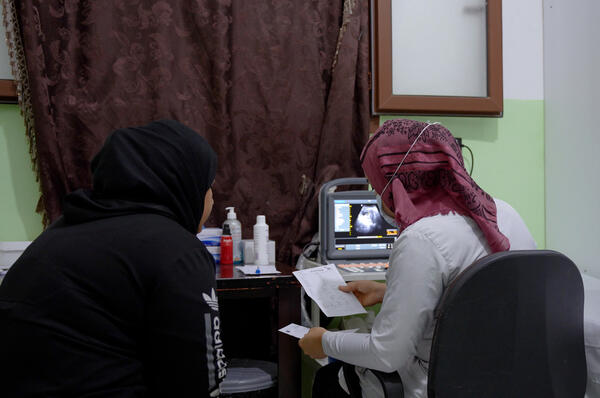“There was no ambulance near my home,” says Mariam Daher, a 33-year-old woman being treated for a miscarriage at a hospital supported by Médecins Sans Frontières (MSF) in northwest Syria. She and her 18-year-old son travelled for 20 kilometers on a motorcycle to reach the hospital. “I was already exhausted by the time I got here, and now I'm wondering how I will get back home on the motorcycle after the procedure.”
The 13-year-long war in Syria, the earthquake in February 2023 and the lack of international support to rebuild healthcare infrastructure have deprived pregnant women and new mothers of their most fundamental right of access to adequate and dignified maternity care, especially during pregnancy and childbirth. This basic right is becoming elusive for pregnant women and new mothers across northwest Syria.
Many hospitals, few services
Historically, women in northwest Syria had access to numerous hospitals and clinics for maternal healthcare, but bombardment and overall violence have destroyed many of these facilities. Now there are fewer places where pregnant women and new mothers can enjoy safer delivery care and maternal healthcare from antenatal through to postnatal care.
As a result, women rely on a small number of functional facilities at considerable distance from their homes, undertaking an uncertain journey due to either damaged roads or security risks.
“When my daughter-in-law's due date arrived, we rushed to the hospital nearest to our home, only to find it closed because of no funding for it to operate, according to the guard outside the hospital. We then went to the neighbouring city, but we were prevented from getting into the city due to fighting,” says 61-year-old Aisha Mansour.
According to UN health cluster reporting in northwest Syria, 160 health facilities were at risk of either complete or partial closure as of June 2024. Nine of these are centres for specialised care. According to the UNOCHA report, 50 per cent of all functional health facilities will fully or partially suspend their activities by December 2024 due to the funding cuts.
Even though a small number of functioning health facilities remain, the services provided to women are limited due to a lack of specialised doctors including obstetrician gynaecologists, medical equipment, medicines and other consumables. Moreover, when women need admission to hospital, they are often refused.
“Specialised doctors are either displaced or have emigrated to the neighbouring countries and beyond, seeking better opportunities,” says Chiara Martinotta, MSF Project Medical Referent in northwest Syria. “This resulted in a lack of obstetrician-gynaecologists to provide advanced maternity care, which has led to the remaining healthcare facilities being overburdened with patient needs.”

©Abdulrahman Sadeq/MSF
Social constraints on healthcare access
"A woman arrived dead due to severe bleeding, and when she was examined by a midwife, there were severe injuries evident. Her mother told us that there was a nearby health facility, but the husband insisted on taking her to a traditional birth attendant instead," says Fatima Al-Nassan, MSF midwife supervisor in northwest Syria.
Pregnant women are frequently obliged to have a male escort when attending healthcare services, and are required to obtain consent from a male relative before considering seeking healthcare in the first place. This can cause delays and affect pregnant women’s mobility in reaching a hospital or clinic in good time especially if finding a suitable escort is difficult.
Women’s household responsibilities like caring for children and managing domestic tasks can significantly limit their ability to prioritise their own health. They may also face social stigma, and fear being judged, preventing or delaying them from seeking medical attention during pregnancy.
“A lot of women regret becoming pregnant. They face criticism from society due to the poor living conditions they are in, and the harsh life in camps. [Some people] believe that bringing more children would only increase their family's hardships,” says Kawthar Ali, a 23-year-old mother displaced from Aleppo.
Intrauterine devices (IUDs) and implants are not provided without husbands’ signed consent in MSF-supported facilities, due to local cultural norms. Early pregnancy also remains a pressing issue tied to social norms. In 2024 alone, one in four girls admitted to MSF supported maternity hospitals were 19 years old or younger.
The impact of economic hardship
I had to buy the medicine from a private pharmacy because the hospital didn't have it,” says Khalid Yusuf, a displaced person living in Jandaris area and a father of seven children. “Our living conditions are bad. I can’t afford to buy medicines.”
Inflation has skyrocketed in Syria, making everything more expensive. Families can’t afford private consultations or surgical procedures. Poverty is widespread, and many pregnant women are anaemic or severely malnourished. In August 2023, the humanitarian agency nutrition cluster in northwest Syria estimated that 7-15 per cent of pregnant and breastfeeding women in Idlib and Aleppo governorates are likely malnourished.
In many internal displacement camps where MSF work, 1 in 5 families have no adult males in the household.
With the loss of male breadwinners and soaring living costs, pregnant women have no choice but to participate in agricultural labour, often elevating risks to their health and the well-being of their unborn babies.
The situation gets worse for displaced people living in worn-out tents on private lands. They are forced to endure extreme conditions during harsh winters and scorching summers. To make matters even worse, some are being threatened with eviction by landowners demanding their land back.
This alarming trend was also confirmed in 2024 estimates from some camps in northwest Syria in Aleppo and Idlib cities where MSF work. With expected more funding shortages, access to essential nutrition services could decline, putting women and babies at even greater risk.
Navigating a healthcare obstacle course
Pregnant women and new mothers living near the frontlines face the ongoing dangers of getting caught in crossfire, becoming victims of violence, or being detained.
Movements are heavily restricted by checkpoints, curfews, and military operations. Women and new mothers must assess these risks and barriers carefully before even leaving their homes and seeking maternity care. This can cause delays or discourage them from seeking care outright.
Uninterrupted maternity care
Since 2023, MSF teams in northwest Syria have assisted more than 25,500 deliveries, performed more than 5,500 caesarean sections, and completed more than 111,000 maternal consultations. However, the growing need for maternity care far outpaces the current capacity, especially as funding for healthcare continues to decrease.
A healthy pregnancy starts with antenatal care. By attending regular checkups, women can receive guidance, early identification of potential risks, and make informed choices about their health. Increased support to maternity care throughout pregnancy and through to the postnatal period can encourage women to prioritise their health and ensure the well-being of their babies.

©Abdulrahman Sadeq/MSF
For MSF, this increased support includes constructing a new maternity hospital in Jandaris area to help address the severe shortage of dedicated maternal healthcare facilities. The hospital will provide comprehensive services such as antenatal and postnatal care, safe delivery services and emergency obstetric care. Additionally, MSF’s team has expanded the maternity service at Al Shahba’a hospital in Mare’e city, offering caesarean sections, surgery and neonatal care, and receiving referrals from other health facilities in northwest Syria.
The pressing need to address the barriers preventing and delaying pregnant women’s access to care in northwest Syria cannot be ignored,” says Siham Hajaj, MSF head of mission in northwest Syria “With the funding cuts, the situation will only deteriorate. MSF urges international donors to recognise the high needs for maternity care and to increase support at both basic and specialist levels, allocating sufficient resources for the women and babies lives at risk.”



